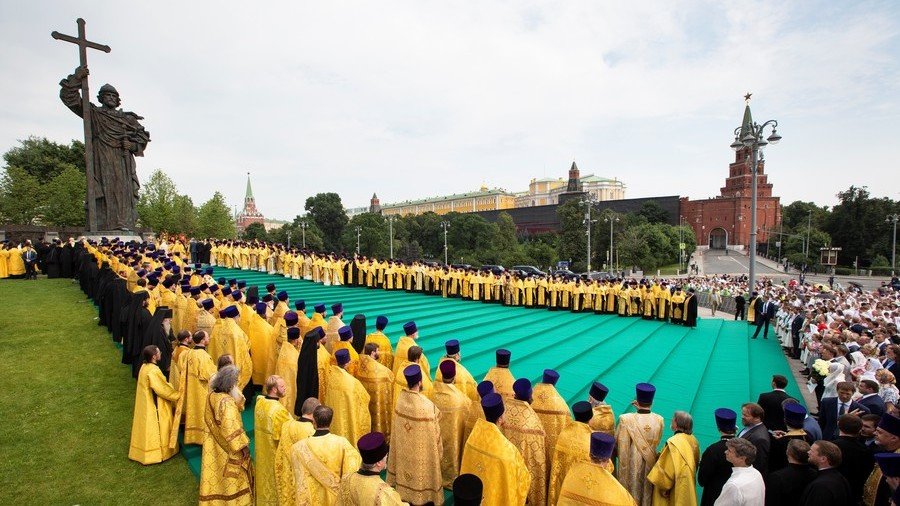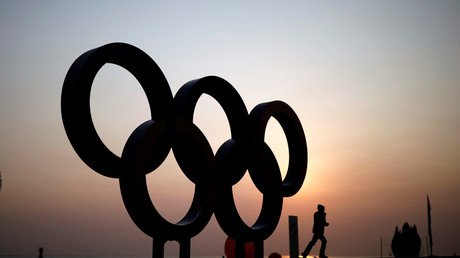Russia, Ukraine & Belarus mark 1,030 years since ancestors adopted Christianity (PHOTO, VIDEO)

Thousands in Russia, Ukraine, and Belarus got together to celebrate 1,030 years since their ancestors adopted Christianity, when Vladimir the Great baptized the Kievan Rus.
Moscow
At noon, the bells in all of Orthodox Cathedrals in Moscow began ringing to mark the holiday. A sacred procession was attended by thousands of worshipers despite the heat of over 30 degrees Celsius in the capital.
The head of the Russian Orthodox Church, Patriarch Kirill, and Russian President, Vladimir Putin, walked together with the people all the way to the monument to Vladimir the Great, where a divine liturgy was held.
Putin congratulated attendees on the holiday, saying that what happened 1,030 years ago was an “event of a civilizational scale” that affected the history of not only Russia, but the whole world.
"Christianization has been the starting point for the formation and development of the Russian statehood as well as the spiritual birth of our ancestors,” Putin said. “The Orthodox faith did something, which wasn’t there previously – it addressed the man, his conscience and his soul, with the eternal call to mercy, kindness and love."
The baptizing, which took place in the Dnieper River, has determined the history of all Slavic nations, Patriarch Kirill said during the ceremony. “The Orthodox moral values have also played an important role in forming the main features of our [Russian] national character – bravery, selflessness, honesty, compassion and heightened sense of justice.”
Kiev
The sacred procession organized for the holiday by the Ukrainian Orthodox Church in Kiev has gathered more than 65,000 people, according to the Interior Ministry.
READ MORE: A millennium of Christianity: What makes Russian Orthodoxy unique?
The celebrations here were also centered around the monument to the baptizer Vladimir the Great, with church leaders, country’s President Petro Poroshenko and government ministers taking part.
Minsk
Celebratory services were also held in all of the cathedrals of Belarus. Metropolitan Paul, the leader of the Belarusian Orthodox Church, led the service at the Church of the Holy Prince Vladimir in Minsk, during which he read out an address from Russian Patriarch Kirill.
Jerusalem
The Holy Trinity Cathedral in Jerusalem held a special liturgy and prayer dedicated to the anniversary of the baptism of the Kievan Rus. The church was founded in 1847 to represent the Russian Orthodox Church to the Jerusalemite Patriarchate and assisting Russian pilgrims arriving in the Holy Land.
Sofia
The Russian community in Bulgaria also celebrated the Christianization of the Kievan Rus, packing the Church of St. Nicholas the Miracle-Maker, also known as the Russian Church, in Sofia. The church’s priest, Hieromonk Zotik, who led the mass, said the holiday is of symbolic importance to both Russian and Bulgarian people.
The Kievan Rus, a nation that spanned parts of modern-day Belarus, Ukraine, and Russia, adopted Christianity in the late 10th century by the will of its leader, Vladimir the Great, who was later made a saint for his deed.
Vladimir, who was looking for a strong religion to keep the vast territories together, considered several monotheistic religions. He eventually chose Byzantine Christianity, evidently because of Kiev’s close ties to Byzantium, which was at the height of its power back then.
Vladimir, who himself accepted Christianity in the Byzantine city of Chersoneses, called the residents of Kiev to the Dnieper River on his return home for a massive baptism ceremony, which initiated the lengthy process of switching the country to the new religion.
Like this story? Share it with a friend!













